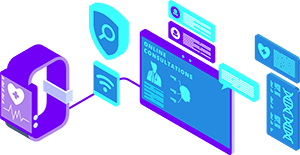AI and Wearables: Personalized Health at Your Fingertips
Wearable technology has rapidly become a staple in the world of health and fitness. From fitness trackers to smartwatches, these devices have long been able to track basic metrics like steps, heart rate, and sleep patterns. However, as Artificial Intelligence (AI) continues to evolve, the potential for wearables to provide deeper, more personalized insights is expanding in ways that go far beyond these foundational data points.
In this article, we’ll explore the advanced AI applications that are unlocking new value from wearables, transforming them from simple tools into sophisticated health companions capable of delivering profound insights into our daily well-being.
1. Personalized Health Predictions: A Step Ahead
While traditional wearables give you data on your activity and sleep patterns, AI takes things a step further by analyzing this data to offer personalized predictions. For example, AI-powered wearables are beginning to assess your body’s unique rhythms and suggest how to optimize your health outcomes.
Imagine your wearable not only tracking your daily steps but also using historical data to predict when you’re likely to be at risk of burnout, injury, or illness. AI models analyze your physical activity, sleep, and other biometric data to predict things like recovery time after intense workouts or when you’re most likely to experience a dip in energy levels. By identifying early patterns, these devices empower users to take proactive steps to manage their health before issues escalate.
2. Real-Time Stress and Mental Health Monitoring
Stress and mental health have often been the invisible aspects of health, making them harder to track and manage. Wearables equipped with AI are starting to address this gap by monitoring physiological markers such as heart rate variability (HRV), skin temperature, and even changes in breathing patterns. By continuously tracking these metrics, AI can detect when a user is under heightened stress, allowing the wearable to provide real-time alerts and actionable suggestions for relaxation or mindfulness.
Additionally, some wearables are beginning to track and analyze sleep quality more intelligently. Rather than simply telling you how long you slept, they can break down the stages of sleep, giving insights into how restorative your sleep was and how that may relate to overall mental well-being. Some even integrate with apps that suggest mood-enhancing activities like meditation or light exercise to help manage mental health in real-time.
3. Chronic Condition Management: AI as a Lifeline
For individuals with chronic health conditions like diabetes, heart disease, or asthma, wearables can provide invaluable real-time monitoring. Advanced AI algorithms can continuously track biomarkers that are essential for managing these conditions—such as blood glucose levels, blood pressure, or oxygen saturation—and alert users (or their healthcare providers) when a potential issue arises.
By using AI to predict flare-ups or detect subtle shifts in health that might otherwise go unnoticed, wearables can help individuals stay on top of their condition and even avoid emergency situations. This proactive approach enables a better quality of life and can reduce the frequency of hospital visits, saving both time and money for both patients and healthcare systems.
4. Predictive Fitness and Performance Optimization
Athletes, fitness enthusiasts, and everyday exercisers alike can benefit from wearables powered by AI. These devices don’t just tell you how many calories you’ve burned or how fast you ran—they analyze your performance in depth and provide insights on how to improve.
AI can assess factors like muscle fatigue, hydration levels, and recovery patterns to create customized workout recommendations. For example, if you’re training for a marathon, your wearable might suggest specific recovery exercises, optimal rest periods, or a change in workout intensity based on the wearer's data and performance trajectory. This predictive approach helps athletes train smarter, avoid injuries, and reach peak performance faster.
5. AI in Wearables for Elderly Care
AI-powered wearables are particularly transformative in elderly care, helping to enhance the quality of life for aging individuals and providing peace of mind for their caregivers. These devices can track a variety of health metrics, such as heart rate, falls, mobility issues, and even medication adherence. AI algorithms can detect early signs of health deterioration, like a sudden drop in activity levels or an irregular heart rate, and notify caregivers or family members.
Furthermore, advanced AI can help elderly individuals with chronic conditions by reminding them of necessary medications, monitoring sleep cycles, and adjusting their care plans based on their current health status. These wearables are a valuable tool for both independent living and as part of broader healthcare networks.
6. Data Integration for a Holistic Health Picture
What truly sets AI-enhanced wearables apart is their ability to integrate and synthesize data from various sources. Instead of relying on isolated data points, these devices can merge information from multiple wearables, apps, and even medical records to create a comprehensive picture of your overall health.
AI can aggregate this data to detect correlations and patterns that would be difficult for a human to see. For example, combining activity levels, nutrition, sleep, and stress levels can reveal deeper insights into your overall wellness that may lead to better health decisions. This creates an integrated ecosystem that not only tracks your progress but actively learns from your behavior and adapts accordingly.
Conclusion: The Future of Wearable AI
The evolution of wearable technology is rapidly progressing, moving from simple tracking devices to intelligent, AI-powered companions capable of providing personalized insights and proactive health management. These advancements are transforming the way we think about health and wellness, offering tools that help individuals better understand their bodies and stay ahead of potential health issues.
As AI continues to improve and wearables become more sophisticated, we can expect even more exciting developments. From deeper predictive analytics to personalized fitness coaching and chronic condition management, the future of wearables is brighter than ever. The true potential lies not just in the data we collect, but in how AI interprets that data to make our lives healthier, more informed, and ultimately more connected to our well-being.







